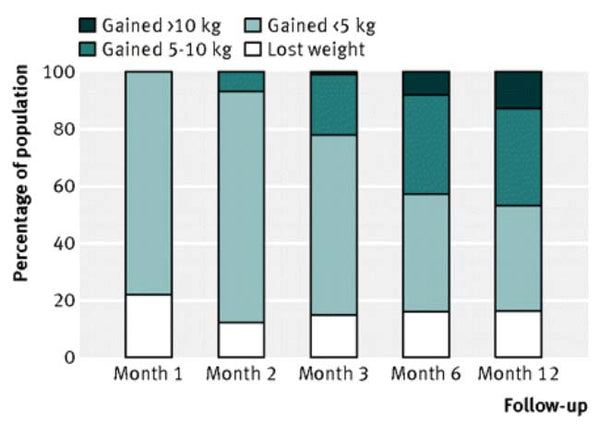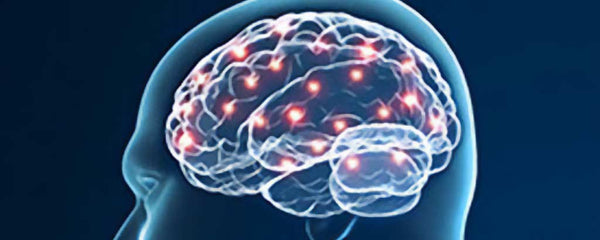Comprehensive, evidence-based guide to effects of drugs on weight gain or loss.
Drug Abuse And Weight
Taking recreational, illegal, and even prescription drugs inappropriately can lead to substance abuse disorders. For the purposes of this guide, a drug is defined as a chemical substance that alters the activity of the brain as well as processes in the body. [1] Drugs often affect people differently, but the harmful side effects that most drugs cause may lead to irreversible health problems, damage and in some cases, death. This guide will focus on commonly abused drugs that negatively impact people’s lives and health.
The Effects of Smoking on Weight
The nicotine contained in cigarette smoke is itself an addictive psychoactive substance. Furthermore, the fact that the rates of cigarette smoking tend to be higher in the demographic of alcohol and substance abusers makes its discussion here particularly germane.

Smoking is a harmful habit that reduces blood circulation to vital organs, increases the risk of developing heart disease, and speeds up the progression of heart disease in people who already have it. [2]
Individuals who smoke heavily may also begin to lose their appetite due to heightened nicotine cravings. [3] This, however, is not healthy weight loss as a person may simply skip one or more meals and decide to smoke instead. Although the individual is losing weight, the body is not being provided with an adequate supply of vitamins and minerals and this often results in unexpected health problems.
Some individuals actually gain weight after they begin smoking because they become more sedentary while smoking, eat higher calorie foods and exercise less. [4]

A serious problem that often occurs when an individual stops smoking is rapid weight gain, but this appears to be mostly associated with substituting food for smoking, especially when nicotine cravings begin. [5] The prospect of weight gain frequently discourages people from quitting, but those who do not quit risk suffering from even more serious conditions such as [3,6]:
- Heart disease
- Heart attack
- Lung disease
- Lung cancer
- Stroke
- Diabetes
- Arthritis
- Asthma
- Atherosclerosis
- Male erectile dysfunction
- Female reproductive problems
- Increased risk of death
To be clear, the risks associated with smoking far outweigh the possible weight gain that may occur if an individual quits smoking. Furthermore, with support and discipline many people have successfully quit smoking without experiencing significant weight gain. Avoiding smoking altogether is one of the best ways to prevent unhealthy weight loss or gain.
The Effects of Drug Abuse on Weight
Recreational, illicit, and prescription medication all influence various mental processes. Certain drugs may cause temporary cognitive impairments after taking just a single dose. If this happens, a person may forget to eat properly, begin to lose weight and develop dangerously low blood sugar. Individuals who begin to abuse drugs may eventually suffer from permanent impairments in brain activity as well as physical changes that lead to dramatic weight loss and poor health.

For our discussion, we’ve broadly categorized three types of drugs commonly taken by adolescents and adults. These include: depressants, stimulants and hallucinogens.
Depressants
Depressants refer to substances that can slow normal processes in the body and reduce physical activity by altering the manner in which the brain sends and receives signals. Alcohol, marijuana (cannabis) and opiates such as morphine, codeine, heroin, methadone, hydrocodone (e.g. Lortab, Norco) and oxycodone (e.g. OxyContin) are all categorized here as depressants.
Opiates
Codeine, morphine, methadone, Hydrocodone and OxyContin are all opiates that can be prescribed by a physician to treat intense pain or certain painful conditions (e.g., cancer). Methadone is even prescribed for some people who are addicted to heroin in order to help them overcome their opiate dependence or addiction. [1]
Dependence occurs when the body builds up a tolerance to an opiate and an individual’s dose has to be increased in order to experience an effect. If the person abruptly stops taking the opiate, serious withdrawal symptoms may be experienced. To mitigate this uncomfortable period of withdrawal, people frequently undergo medically supervised detoxification as an initial step of substance abuse treatment.

Addiction can develop when high doses of an opiate are consumed for an extended period—causing changes in the brain that can result in compulsive cravings and can elicit drug-seeking behavior regardless of the negative effects that the addiction has on a person’s life and health.
Although opiates are commonly prescribed to treat pain, their use can quickly translate to misuse due to the sense of euphoria that people tend to experience after taking this type of drug. It is this feeling of euphoria that generally leads to opiate dependence and addiction in many people. [2]
To varying degrees, the narcotic analgesics in the opiate class can cause side effects that include:
- Drowsiness
- Nausea
- Vomiting
- Constipation
Side effects such as these can lead to a decrease in appetite, slowed digestion and weight loss, over time. In addition, opiate dependence and, especially, addiction can often result in dramatic weight loss when people begin to engage in drug seeking behavior more often than eating properly.
Heroin
Heroin is a particularly dangerous opiate that is highly addictive. It is usually purchased on the street as opposed to abused prescription opiates. Similar to other drugs in this class, its users may display erratic drug seeking behavior, altered eating habits and weight loss if it is taken regularly. [3]

Heroin abusers may experience a brief period of euphoria that is followed by confusion and drowsiness. Prolonged use, and the subsequent repeated cycle of euphoria/drowsiness results in the development of irregular eating habits or forgetting to eat altogether. Long-term opiate abuse also leads to extensive organ damage and disease, which is typically associated with weight loss.
Marijuana
Marijuana, as a recreational drug, is among the most commonly used depressants by adolescents. [4] Excessive marijuana use alters mental processes such as memory and thinking. Most people experience short-term memory problems that may become permanent if a prolonged period of drug abuse starts. Memory problems may result in dietary changes and weight loss. However, a number of individuals who take marijuana experience a subjective increase in appetite that is frequently referred to as the munchies. This may cause overeating and weight gain.

Concentration, hand and eye coordination and reasoning problems may also develop due to marijuana use and this may make it difficult for people to maintain a healthy diet. Long-term problems that may arise from marijuana use include depression and organ damage, especially if marijuana is taken with alcohol. These types of health problems are often associated with fluctuations in weight.
Stimulants
Drugs with stimulant effects—caffeine, ecstasy (MDMA), cocaine and methamphetamines (e.g., speed or crystal meth) among this list—can speed up brain activity, and have the potential to increase blood pressure and heart rate. Stimulants can alter certain mental processes, with people often failing to recognize the homeostatic urges of hunger or dehydration. When stimulants are abused, this effect could result in weight loss and other, more lethal health consequences.
Ecstasy (MDMA)
Ecstasy is a commonly taken illicit drug that is typically sold on the streets. A serious problem that is associated with the purchase of ecstasy involves not knowing whether the drug is made up of a pure product or a combination of other harmful substances. Commonly reported adulterant substances include amphetamine, ephedrine and over-the-counter cold remedies such as pseudoephedrine and dextromethorphan (DXM).
Taking just one dose of ecstasy can cause harmful side effects such as [5]:
- Anxiety, paranoia or depression
- Memory and sleep disturbances
- A rapid, slow or irregular heartbeat, which may result in death
- A rapid loss of sodium (salt) in the blood, which can negatively impact normal functions in the body
The long-term abuse of ecstasy may result in serious muscle tissue damage and the release of muscle enzymes into the blood. These large proteins can deposit in the kidneys, leading to damage or overt renal failure.

Stimulants such as ecstasy often make people feel as if they have high levels of energy and this may prevent them from realizing that they are hungry or have not been drinking enough liquids. Long-term use may result in weight loss. The relatively long acting effects of ecstasy can elevate body temperature, and an accompanying state of dehydration can become quite serious, if not fatal. As with other psychoactive drugs, changes in mental processes can a host of negative influences on a healthy body weight, especially abused for long periods of time.
Cocaine
Cocaine is a highly addictive stimulant that increases blood pressure, suppresses the appetite and can cause regular users to eat fewer balanced meals than those who do not use cocaine. [6] Cocaine abuse also inhibits the ability to gauge the amount of fatty foods that are being eaten when feelings of hunger become dire. [6]

Side effects such as these lead to irregular eating patterns and weight loss. Drug seeking behavior, which commonly occurs due to cocaine abuse, can also reduce the appetite thereby causing individuals to forget to eat properly and eventually begin to lose weight. The cessation of prolonged cocaine use leads to an increase in appetite and subsequent weight gain in some individuals.
Methamphetamine
Methamphetamines (speed, crystal meth, meth) share a number of effect on the mind and body with ecstasy, especially in regard to decreases in appetite and memory function. Of note, long term abuse of amphetamines may cause a syndrome of depression as well. Each of these side effects may result in unhealthy eating habits, weight loss and, secondarily to depression, even weight gain over time. Similar to cocaine cessation, the cessation of methamphetamines after a prolonged period of abuse has, in some cases, lead to a rebound appetite increase with resultant weight gain.
Hallucinogens
Hallucinogens dramatically alter the mind and the senses by causing people to experience a variety of sensory hallucinations—often seeing distorted images or objects that are not really there. These types of hallucinations often occur in conjunction with markedly abnormal behavior, anxiety attacks and paranoia.

PCP, LSD, ketamine and magic mushrooms all have the potential to elicit hallucinations or powerful dissociative experiences. People who take large amounts of ecstasy or marijuana may also report episodes of hallucination.
Hallucinogens can affect emotions, concentration, memory and thinking ability, as well as cause distorted vision and hearing. Drowsiness, sweating, nausea, vomiting and irregular breathing may also occur. [7] This array of issues, particularly in those who abuse them long-term, can lead to loss of appetite and diminished nutrition and, over time, contribute to unhealthy weight loss.
The Dangers of Mixing Drugs
People who begin to take drugs regularly or experiment with drugs may begin to mix them or combine them with alcohol. Mixing drugs with other drugs or alcohol compounds the individual risks inherent to each substance—risks like breathing problems, nausea, vomiting, vertigo, syncope (fainting), abnormal or dangerous behavior and ultimately, the risk of overdosing or dying.
Overall, drug abuse alters the mind and body in ways that make it almost impossible to maintain a healthy diet. Poor nutrition leads to serious health problems, and many diseases that may develop secondarily due to drug abuse also have associated weight changes.
Potential long-term effects of substance abuse
Dramatic weight loss due to substance abuse increases the risk of suffering from low blood sugar, heart arrhythmias, electrolyte and mineral imbalances, gallstones and alterations in blood pressure. Health problems such as these can become long-term and life-threatening.

Dangerously low blood sugar levels may lead to dizziness, confusion, tremors, trouble speaking or coma, while untreated heart arrhythmias may result in death. If the heart begins to beat too rapidly, a side effect of certain stimulants such as cocaine and methamphetamines, the heart can go into sudden cardiac arrest. Even if an individual is resuscitated, major organs may become seriously damaged due to cardiac arrest. [8]
Losing significant amounts of weight may also result in unhealthy overeating to circumvent feelings of hunger or distress regarding the weight loss. Repeated starvation, which may result due to drug seeking behavior and other changes in mental processes that often occur concurrently with substance abuse, leads to the release of neurotransmitters that allow people to eat well beyond the satiation point by overriding their feelings of hunger.
| Drug | During Use | Cessation |
|---|---|---|
| Cigarettes | Loss | Gain |
| Cocaine | Loss | Fluctuation |
| Ecstasy | Loss | Fluctuation |
| LSD | Loss | Fluctuation |
| Marijuana | Gain | Fluctuation |
| Methamphetamines | Loss | Gain |
| Opiates | Loss | Fluctuation |
| PCP | Loss | Fluctuation |
High blood pressure, type 2 diabetes, heart disease, sleep apnea, kidney disease, respiratory problems, cancer and osteoarthritis are among the many long-term health problems that may develop due to weight gain that is concurrent with substance abuse. [8]
In general, the abuse of recreational, illicit, and prescription drugs can all result in similarly disastrous long-term effects on health—with dramatic vacillations in body weight, both up and down.
The Importance of Substance Abuse Treatment
Although various types of effective treatments have been established for substance abuse, it remains one of the leading causes of emergency room visits and death. This, in part, appears to be because people tend to avoid seeking treatment for at least 10 years after their substance abuse has started. [9] Due to this mismatch between available treatment, and the people who are in desperate need of it, substance abuse continues to be a major public health issue.
In addition to causing harmful fluctuations in weight, substance abuse can lead to multiple major organ damage, especially to the kidneys and heart. [10,11] People who have health problems such as arthritis or diabetes tend to worsen their symptoms and even speed up the progression of their condition through drug abuse, with any associated weight changes potentially compounding the damage done.
Chronic substance abusers should be mindful of the painful, debilitating and, in some cases, life-threatening withdrawal symptoms that may develop when the drugs and/or alcohol are stopped. While not an exhaustive list, a withdrawal syndrome can encompass: heavy sweating, pain throughout the body, fever, nausea, vomiting, diarrhea and intense cravings. Even relatively mild symptoms such as these can make it quite difficult for people to overcome their substance abuse without the guidance of medical and treatment professionals.
On a more serious end of the spectrum, acute alcohol and benzodiazepine withdrawal can result in dangerous seizures and even death. For these and a number of other reasons, it is in one’s best interest to seek professional assistance for the treatment of alcohol and substance abuse in order to prevent or address serious health problems, and to help guarantee a positive course of recovery.
To support the writing of scholarly articles about prescriptions, ClinicalPosters sells human anatomy charts, scientific posters, and other products online. You may sponsor specific articles or remit a small donation.
ClinicalPosters sells human anatomy charts, scientific posters, and other products online to offset expense of the writing useful articles about prescriptions. Slide extra posters into DeuPair Frames without removing from the wall.
Show your support by donating, shopping for ClinicalPins, or leaving an encouraging comment to keep the research going.
To support the writing of useful articles about prescriptions, ClinicalPosters sells human anatomy charts, scientific posters, and other products online. You may sponsor specific articles or remit a small donation.
ClinicalPosters sells human anatomy charts, scientific posters, and other products online to offset expense of the writing useful articles about prescriptions. Slide extra posters into DeuPair Frames without removing from the wall.
ClinicalPosters sells human anatomy charts, scientific posters, and other products online. You may remit a small donation.
You can support the writing of useful articles about prescriptions by sponsoring specific articles or remitting a small donation.
References
- Bell JR, Butler B, Lawrance A, Batey R, Salmelainen P. Comparing overdose mortality associated with methadone and buprenorphine treatment. Drug Alcohol Depend. 2009; 104(1-2): 73-7.
- Fishbain DA, Cole B, Lewis J, Rosomoff HL, Rosomoff RS. What percentage of chronic nonmalignant pain patients exposed to chronic opioid analgesic therapy develop abuse/addiction and/or aberrant drug-related behaviors? A structured evidence-based review. Pain Med. 2008; 9(4): 444-459.
- Lundqvist T. Cognitive consequences of cannabis use: comparison with abuse of stimulants and heroin with regard to attention, memory and executive functions. Pharmacol Biochem Behav. 2005; 81(2):319-30.
- McCabe SE1, West BT, Schepis TS, Teter CJ. Simultaneous co-ingestion of prescription stimulants, alcohol and other drugs: a multi-cohort national study of US adolescents. Hum Psychopharmacol. 2014; in press.
- Mørland J. Toxicity of drug abuse--amphetamine designer drugs (ecstasy): mental effects and consequences of single dose use. Toxicol Lett. 2000; 112-113:147-52.
- Ersche KD, Stochl J, Woodward JM, Fletcher PC. The skinny on cocaine: insights into eating behavior and body weight in cocaine-dependent men. Appetite. 2013; 71:75-80.
- Brust JC. Neurologic complications of illicit drug abuse. Continuum (Minneap Minn). 2014; 20(3 Neurology of Systemic Disease):642-56.
- Vittoria Matassini M, Krahn AD, Gardner M, Champagne J, Sanatani S, Birnie DH, Gollob MH, Chauhan V, Simpson CS, Hamilton RM, Talajic M, Ahmad K, Gerull B, Chakrabarti S, Healey JS. Evolution of clinical diagnosis in patients presenting with unexplained cardiac arrest or syncope due to polymorphic ventricular tachycardia. Heart Rhythm. 2014; 11(2):274-81.
- Ruetsch O, Viala A, Bardou H, Martin P, Vacheron MN. Psychotropic drugs induced weight gain: a review of the literature concerning epidemiological data, mechanisms and management. Encephale. 2005; 31(4 Pt 1):507-16.
- Centers for Disease Control and Prevention. Emergency department visits involving nonmedical use of selected prescription drugs—United States, 2004–2008. MMWR Morb Mortal Wkly Rep. 2010; 59:705-709.
- Brick J. Handbook of the medical consequences of alcohol and drug abuse. New York, NY: The Haworth Press; 2004.
This article previously published on ClinicalPosters.com March 18, 2015.

Dr. Karen Vieira, PhD MSM is a research scientist with a PhD in Biomedical Sciences from the University of Florida College of Medicine Department of Biochemistry & Molecular Biology. She has done clinical and laboratory research on diseases, cellular functioning and nutritional supplements. Her focus is helping people make dietary and lifestyle changes that prevent, cure or improve health conditions.








 Romance & Health Intertwine. Fall in love with a captivating romance miniseries that explores the essence of well-being. Become a ClinicalNovellas library member for heartwarming tales.
Romance & Health Intertwine. Fall in love with a captivating romance miniseries that explores the essence of well-being. Become a ClinicalNovellas library member for heartwarming tales.




